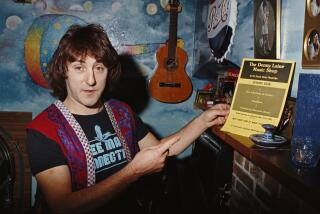Lonnie Donegan, 71; His Music Influenced 1960s Rock Bands
- Share via
Scottish musician Lonnie Donegan, who spearheaded the “skiffle” music craze of the 1950s that inspired John Lennon, Paul McCartney and scores of other teens to take up the guitar and start their own bands, died Sunday in Peterborough near Cambridge, England, while on tour. He was 71.
Donegan had suffered heart ailments for 25 years. He underwent heart surgery in 1992 and again earlier this year. He complained of back pains shortly before he died.
Donegan was known as “the king of skiffle,” a chipper, postwar precursor to rock ‘n’ roll combining country, blues, gospel, jazz and folk music.
A jazzman who loved American roots music, Donegan became an unlikely pop star when “Rock Island Line” exploded in England about the same time that Elvis Presley’s career was taking off in the U.S.
Donegan was born Anthony James Donegan in Glasgow and was playing banjo in Chris Barber’s Jazz Band in 1954 when the group recorded “Rock Island Line.”
The song, an old folk tune long associated with American folk-blues singer Leadbelly, featured Donegan’s kinetic, clipped vocals and energetically strummed guitar over a churning, relentlessly accelerating rhythm that gave British teens their first taste of what would soon evolve into the beat of rock ‘n’ roll.
“He was the first person we had heard of from Britain to get to the coveted No. 1 in the charts,” McCartney said. “And we studied his records avidly. We all bought guitars to be in a skiffle group. He was the man.”
“Rock Island Line,” which reached No. 8 in the U.S. in 1956, was one of just three of Donegan’s many British hits whose popularity crossed the Atlantic. His biggest U.S. success was the jaunty novelty song “Does Your Chewing Gum Lose It’s [sic] Flavor (On the Bedpost Over Night),” which reached No. 5 in 1961.
The irony of Donegan’s influence on the Beatles, the Rolling Stones, the Who and other British bands of the 1960s was that their music quickly relegated his comparatively quaint style to the pop junk heap.
He continued as a performer and songwriter -- he wrote Tom Jones’ 1969 hit “I’ll Never Fall In Love Again” -- and toured when his health was good.
In the late ‘70s, he was saluted by many of the British rockers he had inspired with a tribute album, “Putting on the Style,” for which he was backed by a band including Elton John, Ringo Starr, Queen guitarist Brian May and Rolling Stones guitarist Ron Wood. In 1999 and 2000, he collaborated and toured with Van Morrison.
Donegan was made Member of the British Empire in 2000 for his cultural contributions. He said his big accomplishment was helping to make folk music popular again.
“In England,” he told the Newcastle Journal earlier this year, “we were separated from our folk music tradition centuries ago and were imbued with the idea that music was for the upper classes. You had to be very clever to play music. When I came along with the old three chords, people began to think that if I could do it, so could they. It was the reintroduction of the folk music bridge which did that.”
Donegan had been living in recent years in Malaga, Spain, with his third wife, Sharon, and their three sons, Peter, David and Andrew. He also is survived by four children from his two previous marriages.
A private funeral will be followed by a public memorial. No dates have been announced.
More to Read
The biggest entertainment stories
Get our big stories about Hollywood, film, television, music, arts, culture and more right in your inbox as soon as they publish.
You may occasionally receive promotional content from the Los Angeles Times.










